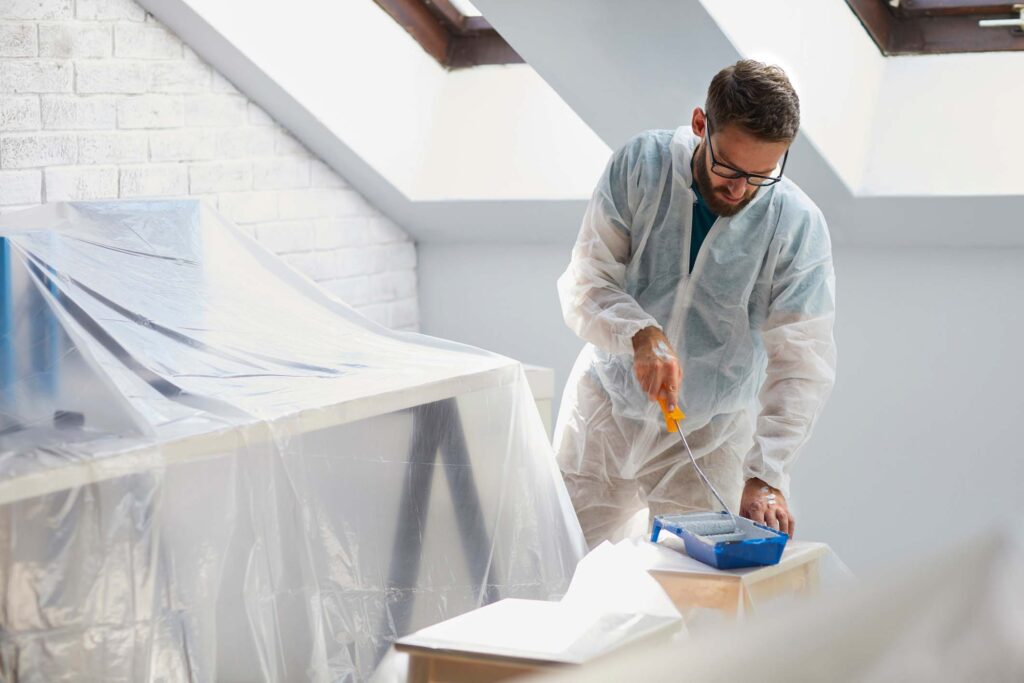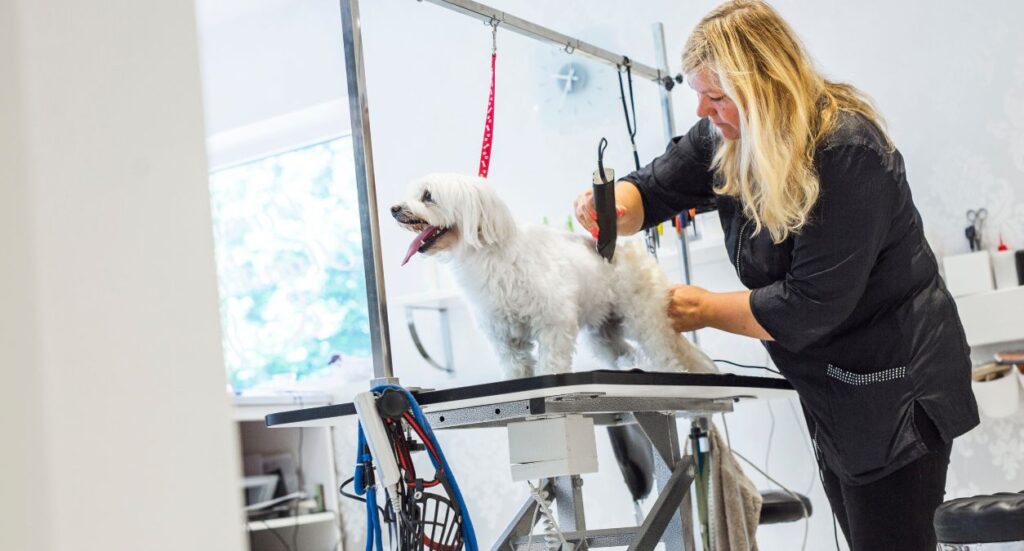Contributors
My main focus is managing the blog and product content for the Protectivity website ensuring everything aligns wi...
Tradespeople are in demand across the UK right now, so it’s no surprise that many people want to know ‘how much does a painter and decorator make?’. Whether working in domestic, commercial or industrial settings, becoming a painter and decorator could help you earn very good money, once you’ve got the right experience in place. But what is the scale of your potential in this industry?
This guide takes an in-depth look at how much painters and decorators can earn in the UK. We’ll look at typical salaries for different levels of experience, how much you could potentially make through a self–employed painter and decorator hourly rate, and what you can do to maximise your earning power.
What is a typical painter and decorator salary in the UK?

The amount that you could earn as a painter and decorator varies substantially, depending on a number of different factors, perhaps the biggest of which is your level of experience. We’ve used figures from Checkatrade research to underline what you can expect to get at different stages of your career – and highlight how your earnings could ramp up over time:
If you’re an apprentice
Typical salary: £6.40 per hour (£11,238 per year)
Typical earnings for a painting and decorating apprentice come in at £6.40 an hour, or £51.20 for an eight-hour day. This equates to an annual salary of £11,238, and the good news here is that this is below the income tax threshold, so you would only be liable to make some small payments towards National Insurance. As a result, you can expect to take home £10,869 a year, which is just over £900 a month – a decent amount with which to combine your studies and training.
If you’ve just qualified
Typical salary: £9.50 per hour (£16,682 per year)
Once you’ve got your basic qualifications in place, you’ll start off somewhere around the National Living Wage level, which varies slightly depending on your age. Typically, you can expect to earn around £9.50 an hour, which means £76 a day. This generates a pre-tax salary of £16,682 per annum, which comes down to £14,837 once tax and National Insurance have been deducted. This is just under £1,250 a month take-home, but as you gain experience and a good reputation, your earnings should increase quite quickly.
If you’re employed full-time
Typical salary: £16.50 per hour (£34,320 per year)
Once you’re settled into full-time employment with a painting and decorating firm, you should be able to attract a decent wage. According to Checkatrade, typical earnings for an experienced, employed painter and decorator are £16.50 per hour, or £132 per day. This would generate a pre-tax annual salary of £34,320, which is a good chunk above the national average salary. Your net earnings would be £26,831, for a take-home of more than £2,200 per month.
If you’re self-employed as a sole trader
Typical salary: £37 per hour (£54,576 per year)
If you decide to branch out and start your own painting and decorating business as a sole trader, then the earning proposition is very different. How much you earn will be dictated by how much you charge as your hourly rate, minus any business expenses you incur, from fuel and transport to materials and safety gear.
A typical self-employed painter and decorator hourly rate is £37, which translates to £296 for an eight-hour day and £54,576 a year. Once expenses, tax, and National Insurance have been deducted, you should still be left with around £36,000, or £3,000 a month take-home.
If you run a limited company
Typical salary: £48 per hour (£70,802 per year)
How much you earn running a limited company depends on whether you’re still doing the work yourself, or whether you’re employing someone to do it for you and taking a management role instead. For the purposes of simplicity, we’ll assume the former here.
The average hourly rate that a limited company would charge for painting and decorating services is £48, which works out at £384 a day. This means you could generate £70,802 a year. However, in addition to expenses and your own tax and National Insurance, you’ll also have to pay corporation tax. What you end up with as your net earnings is therefore highly variable, but within reason, your earning power is unlimited!
Ways to improve your earnings
If you want to push those figures up a notch, or you’re thinking that they may be a little low for your personal financial needs or expectations, then there’s plenty you can do to make more money out of the profession. None of them will necessarily make a huge difference, but all are good ‘marginal gains’ that can help you improve your earnings incrementally:
Get more qualifications
When the public are looking for a self-employed painter and decorator, they want maximum confidence that they’re working with the right person for the job. The best way to convince them of your abilities is to gain more qualifications at more advanced levels: ideally, you should adopt a continuous approach to education and constantly be on the lookout for new skills and techniques.
Specialise your offering and skills
If you want to stand out in a competitive marketplace, then pursuing some specialist skills and types of painting and decorating can help. It will give you a niche that not many of your competitors will offer, and also may allow you to charge a premium. This could be anything from particular types of paints and materials, to heritage conservation or commercial premises.
Expand and move yourself into admin
As mentioned above, if you’re experienced and operating as a limited company, you could move into a management and admin role. This means you’ll be involved in quotes, estimates, contract management, design, sales and materials procurement, and you’ll be employing other people to do the actual painting and decorating for you. If you’re employed by someone else, you may find that larger firms also have their own openings for these types of roles.
Raise your rates
Perhaps the simplest way to generate more income is to put your prices up. Far from being an opportunity to grab more cash, many businesses have had to do so to counteract their own rising costs, but this still ensures a greater level of profitability. Raising rates should be done with caution, though: you don’t want to go too far and price yourself out of the market relative to your local competitors.
Look for cost savings
If you don’t feel you can put your prices up, then the best alternative is to look at ways at bringing your costs down. Naturally, you don’t want to compromise in quality of goods or services, but there may well be some efficiencies in your business processes. Think along the lines of more economical transport, using tools and equipment for longer before replacing, or even bringing a packed lunch instead of buying food on the go.
Explore tax efficiencies
If you operate as a limited company, then work with a good-quality accountant, who will be able to advise on ways for you to minimise your tax liabilities within the boundaries of the law. For example, you may be able to reduce your income tax and National Insurance liabilities by paying yourself a small salary and the rest in business dividends. See our limited company tax guide for more details.
Protect yourself against claims
One of the biggest impacts your earnings might face is if you have to deal with a claim for compensation. This could be because you’ve accidentally damaged some customer property, not completed work to the expected standard, or an employee who works for you has got hurt on the job. You should always make sure you’re insulated against these major expenses.
Affordable painter and decorator insurance from Protectivity
At Protectivity, we provide affordable tradesman public liability insurance which is specialist cover for small businesses, sole traders and self-employed trades people.
Our policies include public liability as standard with the option to add employers’ liability if you hire other people and all-risk insurance which can include a combination of plant and tools cover and contractors works insurance. That way, when unforeseen circumstances occur, you and your business won’t end up out of pocket.
Starting from just £4.16 a month, our cover represents a minimal business expense but could potentially save you thousands of pounds in the long run. We now also offer specialist tools cover to protect your tools and equipment.
Take two minutes today to take a closer look at our painter and decorator insurance policies.
Get Painters and Decorators Insurance from Protectivity
*Disclaimer – This blog has been created as general information and should not be taken as advice. Make sure you have the correct level of insurance for your requirements and always review policy documentation. Information is factually accurate at the time of publishing but may have become out of date.
Last updated by

















